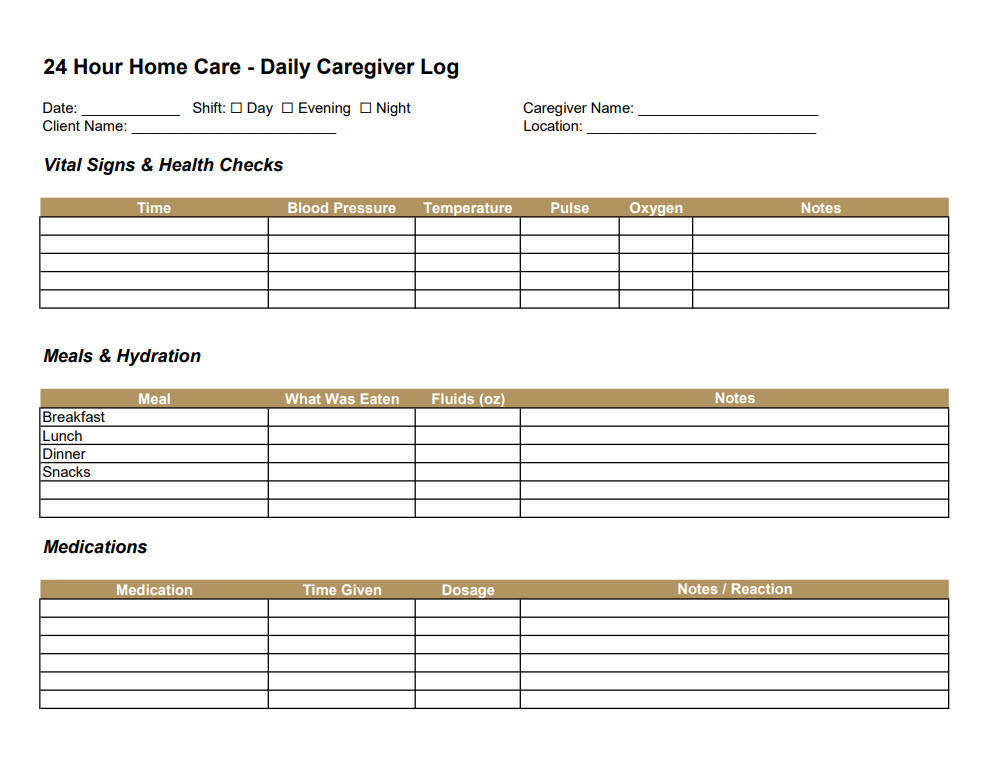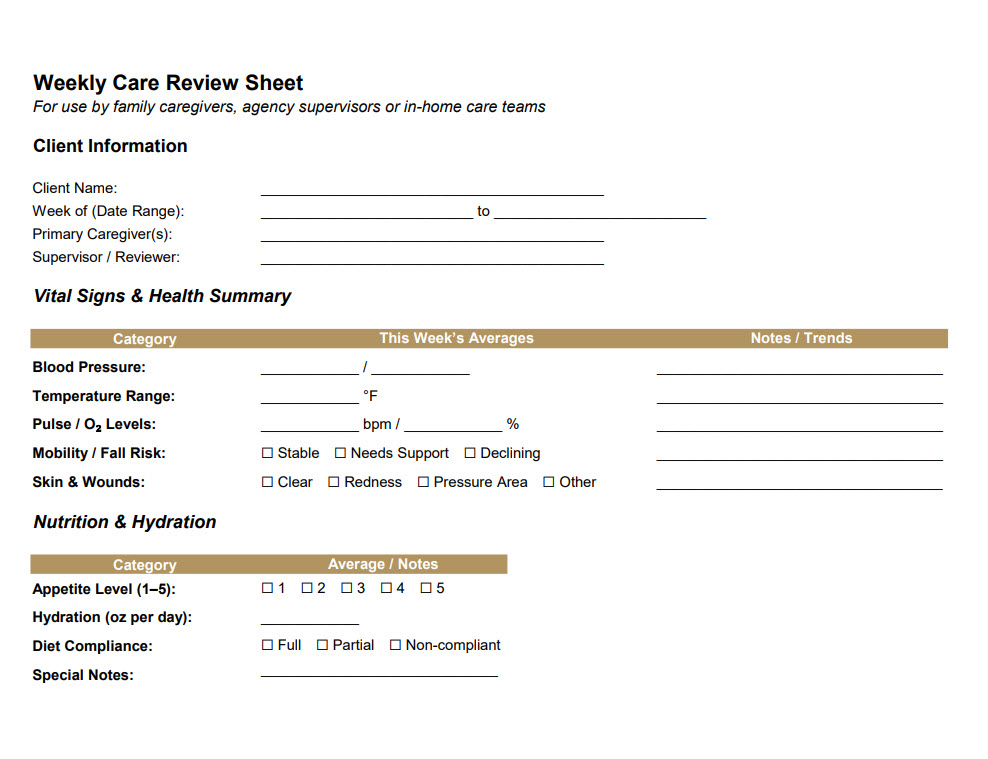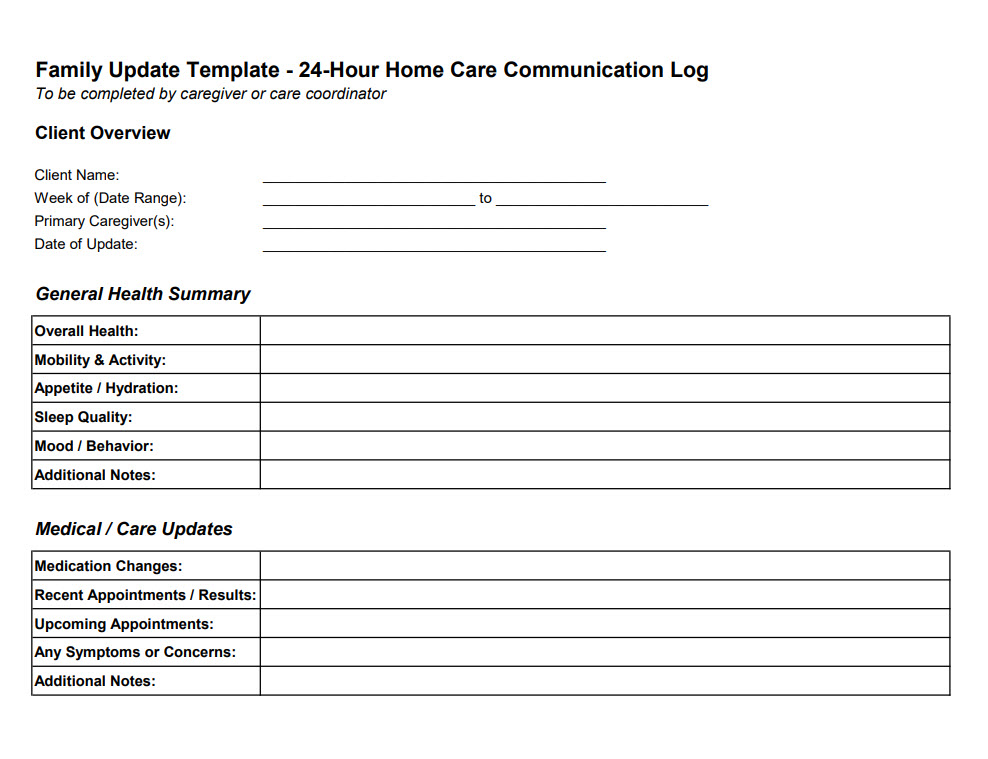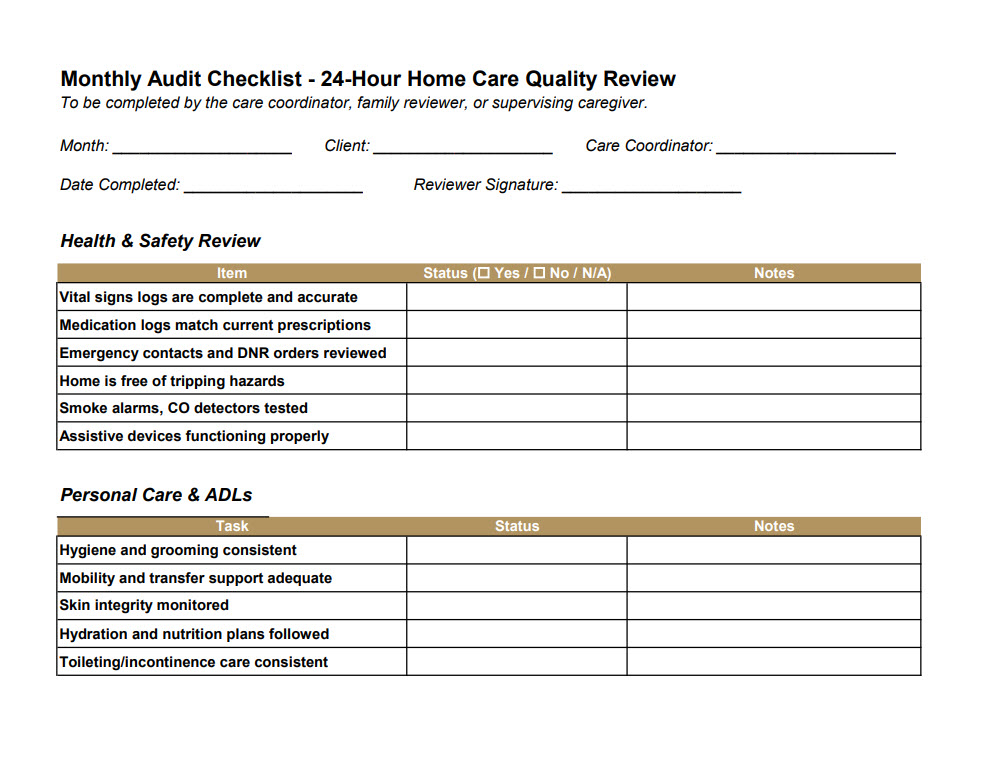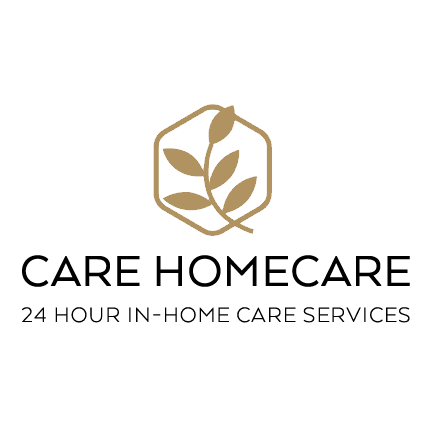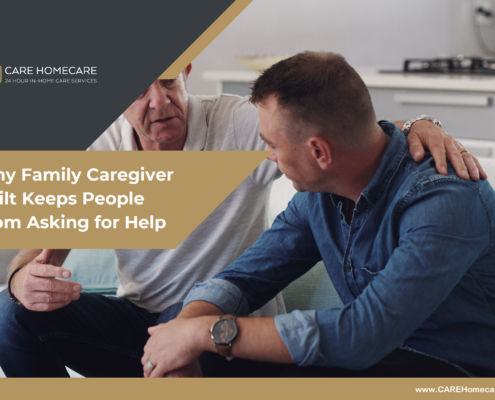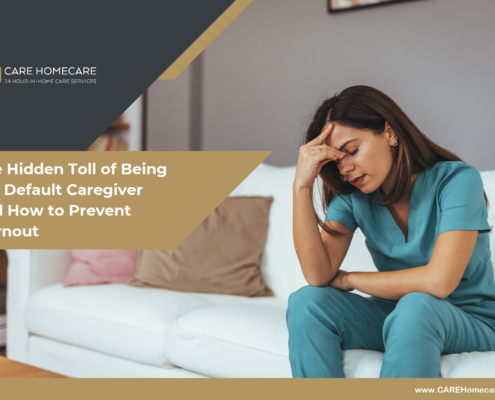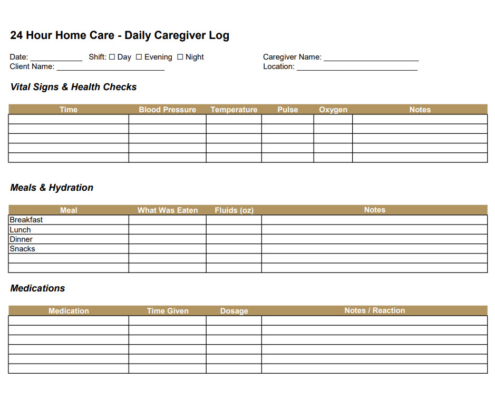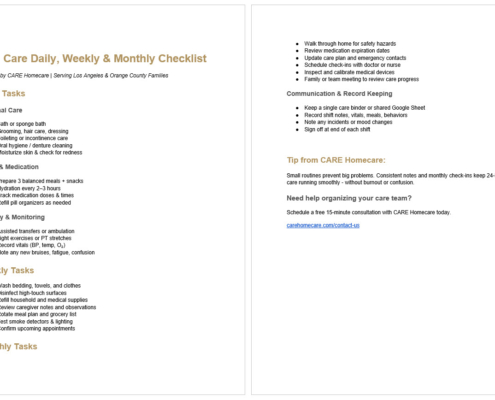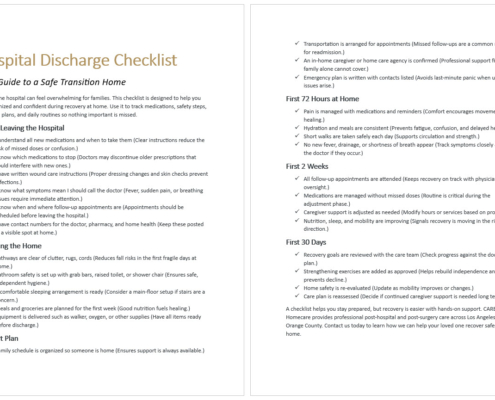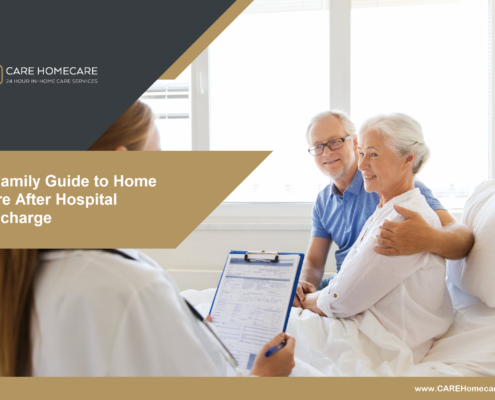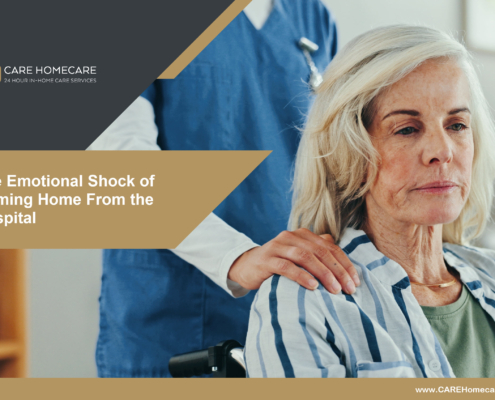Contents
24/7 Home Care Documentation – Logs, Checklists and Family Updates
Caring around the clock requires more than compassion. It demands coordination, consistency and clear communication.
Without a reliable system to document what happens hour by hour, important details get lost between shifts, medications overlap, and family members are left in the dark.
That’s why structured 24-hour care documentation is essential. Whether you manage a rotating team of caregivers or share responsibilities within your family, using standardized logs and checklists keeps care predictable and safe.
Families exploring options for full-time care can learn about the difference between 24-hour and live-in care, which affects how shifts are scheduled and documented.
Learn how 24-hour home care services in Los Angeles or Orange County can make this process easier.
Download the 24/7 Care Documentation Kit
Keep 24-hour home care organized, consistent and stress-free with our complete set of documentation tools for caregivers and families. Each template is fillable, printable and designed by CARE Homecare.
Choose what you need below or download all four together to simplify your care routine:
Shift-by-shift record of vitals, meals, medications and observations.
Summarize weekly progress, health trends, home environment and care notes.
Keep family members informed with structured communication logs.
Review overall care quality, safety and compliance each month.
24/7 Home Care Support Across Los Angeles and Orange County by CARE Homecare
Even the best documentation can’t replace dependable hands-on care. CARE Homecare provides flexible hourly and 24-hour in-home care across Los Angeles and Orange County, helping families maintain safety, consistency and peace of mind day and night.
Our trained caregivers support every aspect of daily living – from safe mobility and medication reminders to companionship, meal preparation and nighttime supervision. We ensure care plans are followed, documented and updated so families always stay informed.
Why Documentation Matters in 24-Hour Care
In a 24/7 home care setting, multiple caregivers may rotate across day and night shifts. Without consistent documentation, it’s easy to miss small but critical details – a skipped dose, a change in appetite or early signs of a fall risk.
Accurate records allow everyone involved (family, agency, and healthcare providers) to stay aligned.
That alignment is part of what defines quality home care services – consistent routines, timely communication and proactive observation.
Good documentation supports:
- Continuity of care between shifts
- Faster responses to health changes
- Reduced hospital readmissions
- Peace of mind for families and care teams
(Learn more about what professional caregivers do in What Do Home Care Providers Do
Daily Logs – The Foundation of 24/7 Care
A daily caregiver log helps track vitals, meals, medications, and emotional status in real time. It provides a running snapshot of each day and ensures that the next caregiver starts fully informed. Tracking also supports activities of daily living (ADLs and IADLs), helping caregivers monitor personal care and independence levels.
Common sections include:
- Vital signs (blood pressure, temperature, oxygen levels)
- Meals and hydration tracking
- Medications and reactions
- Mobility and exercise notes
- Mood and cognitive observations
- Family or supervisor notifications
Print or Download: Daily Caregiver Log – 24-Hour Home Care (PDF)
A fillable form for shift-by-shift tracking of client care and activities.
Weekly Reviews – Spot Trends Before They Escalate
Over time, small daily changes can add up. A weekly care review helps identify patterns such as decreased appetite, increasing fatigue or early signs of depression – before they become major issues. Regular reviews can also highlight emotional shifts that signal the need for stronger mental health support for older adults.
The weekly review can include:
- Summarized vitals and notes from the week
- Medication adjustments
- Emotional and behavioral trends
- Family communication summary
- Recommendations for the next week
Print or Download: Weekly Care Review Sheet – 24-Hour Home Care (PDF)
A weekly summary template for caregivers and families to align on progress and care adjustments.
Family Communication Logs – Keeping Everyone in the Loop
One of the biggest challenges in home care is making sure families feel informed and involved without being overwhelmed. A communication log bridges that gap by tracking updates, questions, and feedback between caregivers and family members.
Each entry typically includes:
- Date, time, and author (caregiver or coordinator)
- Notes on condition changes or incidents
- Messages or follow-up actions for family or agency supervisors
Print or Download: Family Update Template – 24-Hour Home Care Communication Log (PDF)
A simple, structured form for caregivers and families to stay connected.
Monthly Quality Audits – Measuring Long-Term Success
For ongoing 24-hour care, monthly reviews are vital. They provide a chance to step back and evaluate the bigger picture – not just day-to-day tasks but overall care outcomes. Regular reviews like these also help reduce risks of complications or readmission, especially after hospitalization. Learn more in our guide on preventing hospital readmission after surgery.
These audits may cover:
- Home safety walkthroughs
- Equipment checks and supply tracking
- Caregiver performance and training needs
- Health goal progress and care plan updates
- Documentation completeness
Print or Download: Monthly Audit Checklist – 24-Hour Home Care Quality Review (PDF)
A professional-grade review form for supervisors or families to evaluate care consistency and safety.
FAQs – 24-Hour Care Documentation and Logs
What should caregivers document in 24-hour care?
Caregivers should record vital signs, meals, hydration, medication times, mood and mobility observations each shift. Notes help ensure continuity and accountability between caregivers.
Who reviews the documentation?
Typically, the family, care coordinator or home care agency supervisor reviews daily and weekly logs to identify any care gaps or safety concerns.
How often should care plans be updated?
Care plans should be reviewed monthly or whenever there’s a significant health change, hospitalization or new medication.
When You Need More Than Paperwork
Documentation is just the beginning. Reliable 24-hour home care depends on consistent staffing, trained caregivers and responsive oversight.
At CARE Homecare, we specialize in 24-hour and live-in home care across Los Angeles and Orange County. Our caregivers assist with:
- Personal care and ADLs
- Medication reminders
- Companionship and mobility support
- Overnight monitoring and safety supervision
Book a free 15-minute consultation
Contact us today or call (323) 851-1422 or email info@carehomecare.com to receive a personalized 24/7 care plan and starter documentation kit.

